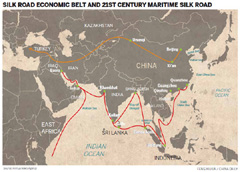The Silk Road economic belt provides a historic opportunity for the development of all Asia, but regional cooperation still faces challenges that require countries to enhance mutual trust and increase communication and cooperation, a senior Foreign Ministry official said on Wednesday.
"Reviving the Silk Road economic belt is not only needed for China's economic development, given that China has uneven development in our eastern and western regions, but it is also in the interests of other Asian countries," said Liu Jianchao, assistant minister of foreign affairs, at the Asia Cooperation Dialogue Forum on Silk Road Cooperation.
The event in Lanzhou, Gansu province, attracted about 200 people, including government officials from 28 of the 33 ACD member countries and representatives from domestic academic institutions.
"Asian countries all face pressure in their national economic transitions. Deepening cooperation among countries and promoting the regional flow of production are issues that all of Asia needs to solve," Liu said.
Liu also suggested that Asian countries build up regional business and trade cooperation, and promote the establishment of an Asian free trade zone.
"The infrastructure in Asian countries is comparatively undeveloped. Promoting and improving the construction of infrastructure in ACD member countries is vital to the development of the Silk Road economic belt, and capital is a big problem. China calls for establishing an Asian Infrastructure Investment Bank," he said.
Liu's suggestions were echoed by officials and representatives of the ACD member countries who attended the meeting. They said cooperation should be extended to more fields, such as energy, environmental protection, tourism and culture.
"The ancient Silk Road was the world's most important cross-border artery for commercial, cultural and technological exchanges between East and West. Its tasks and goals remain the same nowadays, but in a more demanding way," said Nizomiddin Zohidove, Tajikistan's deputy minister of foreign affairs.
"The tradition of the ancient Silk Road is acutely needed in our modern world. Despite unprecedented achievements of the human intellect, we still have conflicts and wars, economic instability and financial crises, and barriers to trade and cultural exchanges still remain. The revival of the Silk Road is an essential necessity and call of our time," he said.
"It's my understanding that regional connectivity should greatly involve people's contacts with the wide possibility of visits, exchanges, education, training and tourism."
He also suggested that among the important directions of the infrastructure connectivity are establishing reliable transport-transit systems, simplifying trade procedures, encouraging cross-border trade, effectively using water-power resources, creating an integrated power system and allowing free movement of goods and labor throughout the region.
Chutintorn Gongsakdi, director-general of Thailand's Department of International Economic Affairs under the Thai Foreign Ministry, said he agrees with the establishment of an infrastructure fund, and he recommended mobilizing international public and private funds for connectivity projects.
"To foster a sense of an Asian community and co-ownership, we need to incorporate the private sector and other stakeholders into the ACD framework to promote concrete cooperation at all levels," he said.
"The revived Silk Road can serve as a new driver for growth, bringing access to the global value chain to all countries and people along the path. Thailand will host a high-level forum on ACD regional connectivity later this year."

 Print
Print




